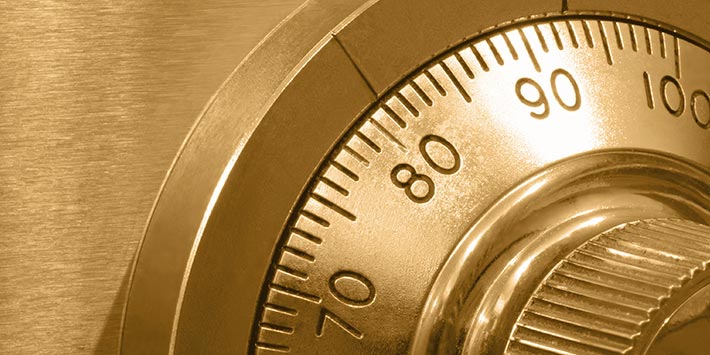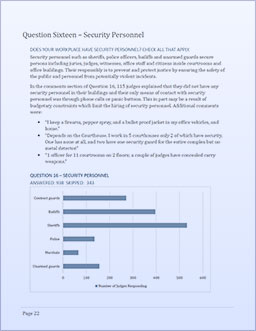
By Chief Inspector John Muffler
U.S. Marshals Service, National Center for Judicial Security
Since 2008, I have served as faculty at The National Judicial College on the topic of judicial security and as such, had the opportunity to receive feedback from the judges whom I teach about their security realities. I began to recognize that outside of the security data for Title III U.S. judges, there is a dearth of threat and security data for general and special jurisdiction, state appellate, military, tribal and administrative law judges. This fact prompted me to partner with The NJC, its staff and alumni, on a judicial security survey last fall that would identify security issues for the NJC’s constituents, raise awareness, stimulate dialogue and bridge gaps across the paradigm of judicial security.
Protecting the integrity of the justice system with robust protective measures while allowing the general public access to air their grievances and speak and move about freely, can appear contradictory at times. Webster’s defines “freedom” as “the power to do what you want to do; the ability to move or act freely while security is defined as the freedom from danger, from fear or anxiety.” These two words — freedom and security — juxtapose two inalienable rights. Balancing security with the rights of a free and democratic society is a challenge that faces court administrators, security providers and judicial and administrative judges across the country daily.
By their very nature, courts and courthouses are meant to be open but with that comes risks. Today, courts and judges across the nation are under political and personal microscopes. Judicial decisions are dissected by media, affected families, and parties. Whether through an emotional connection to a case or other reasons, judges have become targets from affected parties and from the general populace. Since the mid-1980s the United States Marshals Service, Judicial Security Division has tracked over 16,000 threatening and inappropriate communications to their protectees. There have been assassinations, attempted assassinations, stalking, harassment and approach type behaviors towards these officials from disgruntled litigants and members of the public. It can be safely argued that these threatening behaviors are an effort to exact revenge, right a perceived wrong, or to intimidate to affect change in their favor.
Judicial facilities have received much public funding to secure them but many facilities lack basic security and many court/hearing rooms have none. Attacks have happened in courthouses and hearing rooms, while a judicial officer is in transit, or at his or her residence. Mitigating the risk to a judge 24/7/365 is paramount. Protective measures in the courthouse environment and in an open, fluid and risky environment outside the workplace, requires the judge, law enforcement and security managers to be innovative and change mind-sets. One way to do this is through educational personal security programs, such as those offered at the NJC, which raises the awareness of all parties.
The judicial security survey is but one way to begin that process. Short and long-term forecasts must be developed, dedicated resources created or enhanced, all in an effort to secure the efficiency, fairness and transparency of our judicial and administrative legal system.
Our democratic system of government is founded upon a fair and impartial administration of justice; it is one side of the scales of justice and the cornerstone of our freedom. A judicial system that can function without fear of reprisal is vital to the integrity of our democracy and the success of our Nation. Providing the necessary protective measures that enables justice to rule objectively is the counterbalance of those scales. This survey is dedicated to judicial officials, their loved ones, court staff, membership of the National Judicial College, security providers and all law enforcement with a stake in judicial security and public safety.
To read the report from the 2014 survey, please click here. For more information about or technical assistance from the U.S. Marshals Service National Center for Judicial Security, please visit www.usmarshals.gov/judicial. A comprehensive report on the survey will be available in early 2015.

Happy October, Gaveliers faithful. Are you loving this or what? No one believed a team made up of judges...


Hon. Diane J. Humetewa, the first Native American woman and the first enrolled tribal member to serve as a ...

Retired Massachusetts Chief Justice Margaret H. Marshall has been selected as the 2024 winner of the presti...

Dear Gaveliers Fans: I am delighted to announce the appointment of our first Gaveliers coaches, profiled...
